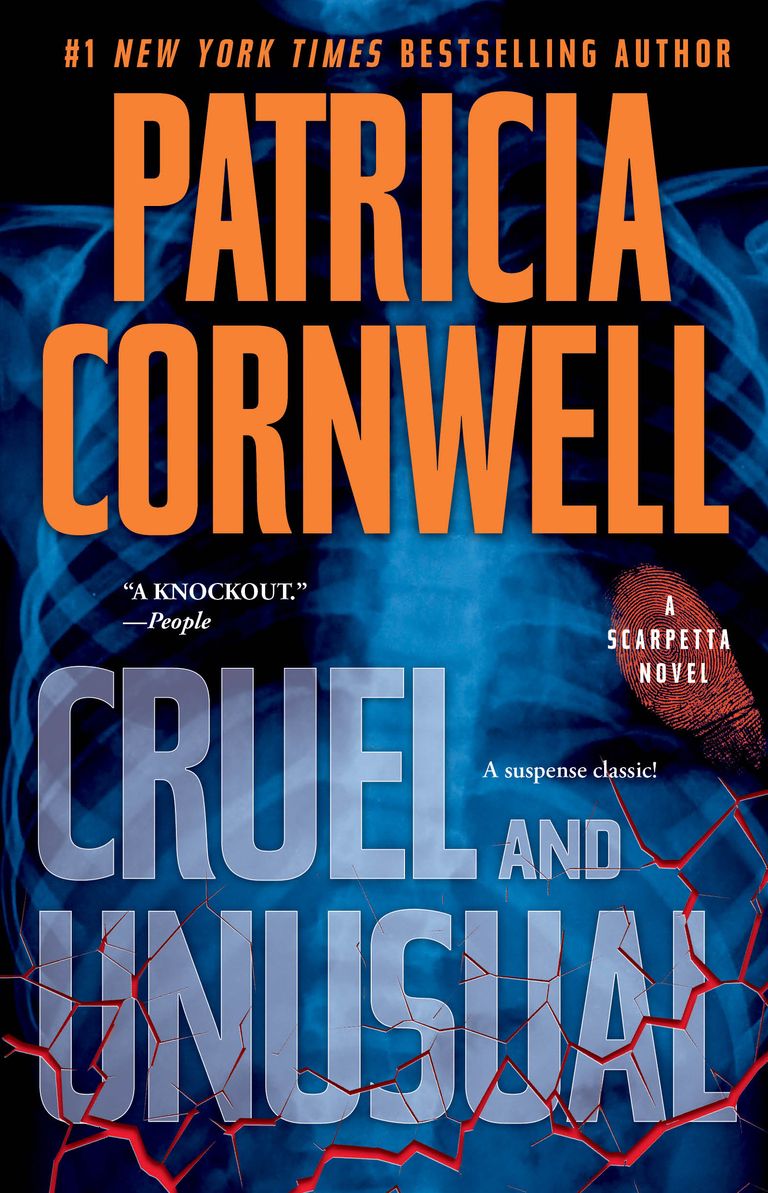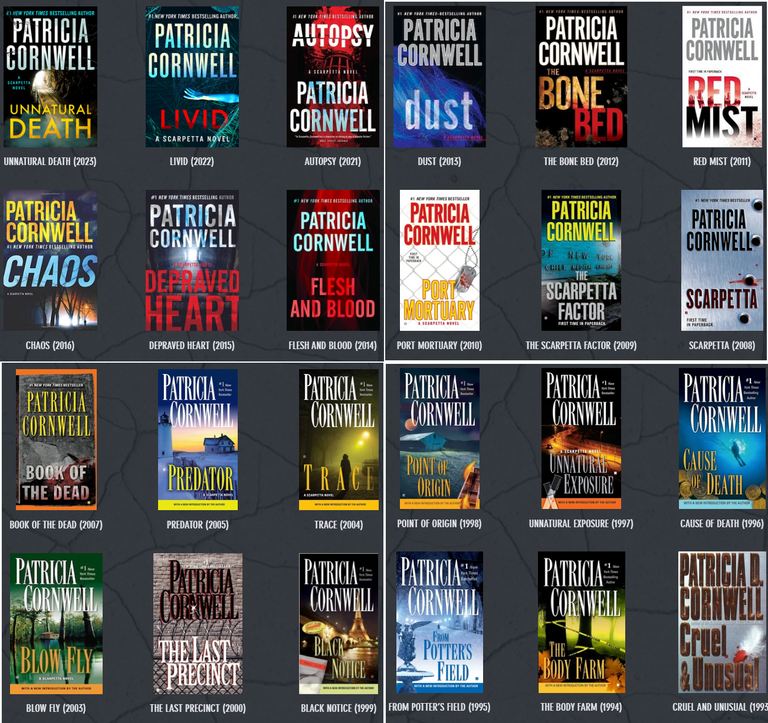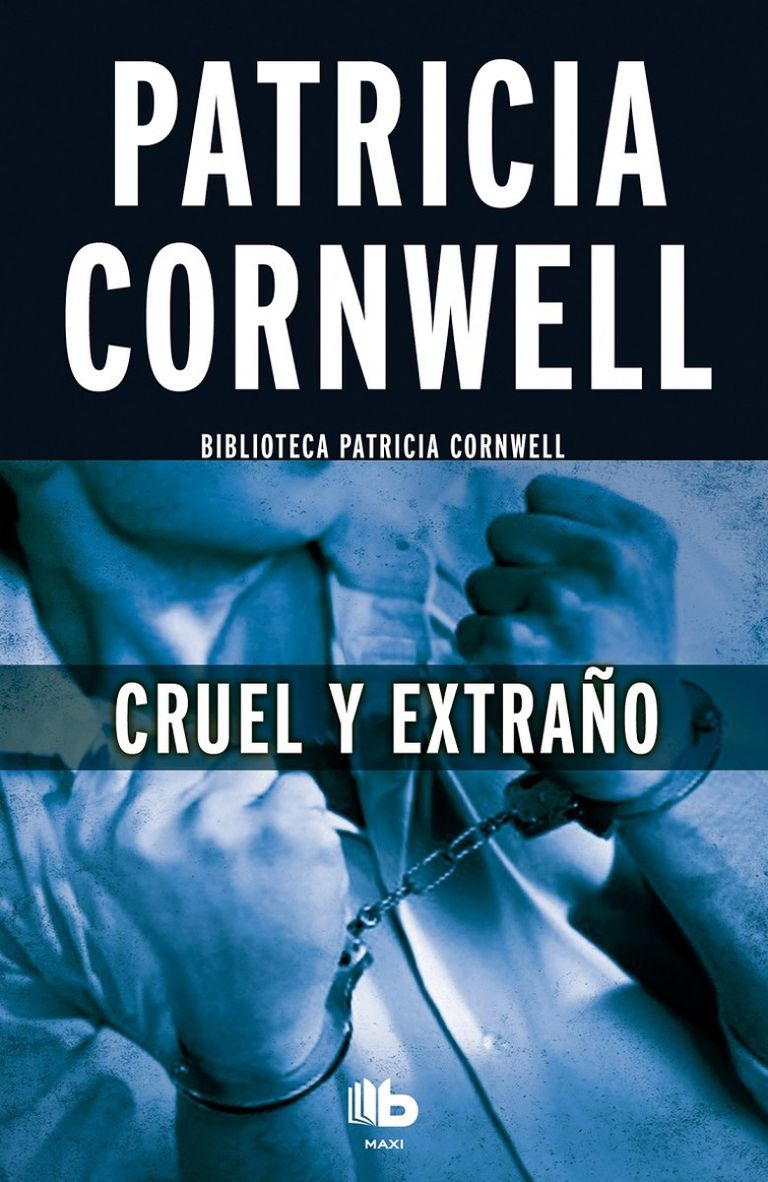
Cruel and Unusual is a novel by Patricia Cornwell published in 1993. The novel won the 1993 Gold Dagger Award and is the fourth volume in the saga of Dr. Kay Scarpetta.
It has the particularity of being written in the first person, that is to say, it is Kay who narrates the circumstances she has to go through in this new case.
Scarpetta is still head of the forensic department of the Virginia police, Wesley Benton is still married to Connie (he will later separate and join Kay's fate). Pete Marino is serving as a lieutenant in the State Police, and Lucy is just beginning to take her first steps into adolescence, although she is already revealing herself to be a true computer prodigy.

Richmond, Virginia. Ronnie Joe Waddell is executed in the electric chair for the murder of TV presenter Robyn Naismith, murdered many years earlier. While waiting to perform the autopsy on Waddell's body, Kay Scarpetta also has to operate on Eddie Heath, a 13-year-old boy beaten to death on the doorstep of a shop, probably the victim of sexual assault. During the Christmas holidays, a series of murders take place, linked by the fact that a pen and fingerprints of people who cannot be responsible were left at the scene. The siege tightens around Kay, who faces a harsh media attack against her and, for the first time, her undisputed career as chief coroner, as well as her own life, are in serious danger.
PROLOGUE
Meditation of the Damned of Spring Street
Two weeks to Christmas. Four days to total nothingness. Lying on my bed, I stare at my bare feet and the loo: white and without a board. I no longer flinch at the passing cockroaches: they look at me, and I look at them.
I close my eyes and breathe slowly.
I remember when I used to rake hay, under the scorching sun, and compared to the whites they gave me nothing. I dream of toasting peanuts in a tin, and munching on tomatoes like ripe apples. I imagine driving the truck, my face streaked with sweat in that hated place I swore I would leave.
I can't use the loo, blow my nose or smoke without the guards spying on me. I don't have a watch. I don't know what time it is. I open my eyes and a white wall runs up to the other side. How must a dying man feel?
Like a sad, sad song. I don't know the words. I don't remember them anymore. They say it happened in September, when the sky is a robin's egg and burning leaves rain down on you. They say a beast went wild in the city. Now there will be one less noise.
Killing me will not kill the beast. Darkness is her friend: flesh and blood her life. Brother, you think you can relax: instead it is time to start keeping watch.
One sin leads to another.
Ronnie Joe Waddell
The Monday I slipped Ronnie Joe Waddell's meditation into my purse, I saw no sunlight. When I left for work it was still dark, and it was dark even when I got home. Tiny raindrops swirled in the light of the headlights, evening loomed cold and misty.
I lit the fireplace in the living room, imagining the expanses of Virginia fields and tomatoes ripening in the sun. I saw a young black man in the hot cab of a pick-up truck, and wondered if murderous thoughts were already stirring in his mind. Waddell's meditation had been published in the Richmond Times-Dispatch and I had taken the newspaper clipping to the office to add it to his dossier. Then the day's engagements had distracted me, and the meditation remained in my bag. I had re-read it several times, amazed at the way poetry and cruelty could coexist in the same heart.
For a while I tidied up the bills to be paid and wrote Christmas cards, while the TV set transmitted images without sound. As the hour of an execution approached, I, like other Virginians, learned from the media whether the governor had refused or granted the request for a pardon - and thus whether I could go to bed or return to the morgue.
Around ten o'clock the phone rang. I answered it, convinced it was my deputy or some other member of staff, waiting as I was to hear what turn the evening would take.
‘Hello?’ said a male voice that I did not recognise. ‘I would like to speak to the chief medical examiner, Kay Scarpetta.’
‘That's me,’ I replied.
‘Oh, good. This is Detective Joe Trent from Henrico County. I found your number in the directory, sorry to bother you at home.’ From his tone he sounded nervous. ‘It's just that we're in a situation... we could really use your help.’
‘What is it about?’ I asked, staring anxiously at the television set. They were broadcasting a commercial. I hoped they didn't want me at the scene of a new crime.
‘A few hours ago a thirteen-year-old white boy was lured out of a shop on the Northside. He was shot in the head. There may be some sexual overtones.’
My heart sank. I reached for a pen and paper. ‘Where's the body?’
‘They found him in the back of a big grocery store on Patterson Avenue. I mean, that he's not deceased. He hasn't regained consciousness yet, and in fact we don't even know if he's going to be OK. So, since there's no death involved, I know it's not a case for you. But, you see, the thing is, some of the wounds are really strange. I've never seen any like it. I know you have a lot of experience, so I was hoping you could help me understand how and why they were caused.’
‘Describe them to me,’ I said.
‘So, first, let's talk about two areas: one on the inside of the right thigh, up towards the groin, the other around the right shoulder. Whole pieces of flesh are missing, as if they had been removed, and scratches and strange incisions appear along the edges of the wounds. He is at Henrico Doctor's at the moment.’
‘Have you found the severed tissue?’ I was mentally rifling through my archives looking for any analogies with such cases.
‘Not yet. However, our men are continuing the search, although the attack may have taken place inside a vehicle.’
‘What vehicle?’
‘The attacker's car. The car park where the body was found is about six kilometres from the shop where the boy was last seen. He probably got into someone's car, perhaps by force.’
‘Did you take pictures of the wounds before taking him to the hospital?’
‘Yes, although the doctors can't do much. Given the amount of missing skin, a transplant will be necessary - a full thickness transplant, they said.’
It meant that they had cleaned his wounds, administered intravenous antibiotics and were now waiting to perform a skin graft from his buttocks. If, on the other hand, they had changed their minds and removed his surrounding tissues and then sutured, then there wasn't much left to see.
‘They didn't suture the wounds,’ I said.
‘So I was told.’
‘Would you like me to come and have a look?’
‘That would be great,’ he said, relieved. ‘Then he can examine the wounds himself.’
‘When?’
‘Oh, tomorrow would be fine.’
‘All right. What time? If you don't mind I would prefer early.’
‘Is eight o'clock OK? I'll be waiting for you in front of the emergency room.’
‘I'll be there,’ I said, as the television announcer stared darkly at me. I hung up, grabbed the remote and turned up the volume.
‘... Eugenia? Any news from the governor?’
The camera panned to the state penitentiary: a rocky stretch of the James River, just outside the city centre, where the worst criminals in Virgìnia had been crammed for two hundred years. In the darkness, protesters armed with placards and supporters of capital punishment with suddenly angular faces stirred in the harsh light of the spotlight. The sight of some laughing faces froze the blood in my veins. Then, a pretty young correspondent in a red coat leapt into the foreground.
‘Here I am, Bill,’ she exclaimed. ‘As you know, a direct telephone line was established yesterday between the penitentiary and Governor Norring's office. No news yet, but that says a lot: if the governor doesn't intend to intervene, he's keeping quiet.’
‘And what is the atmosphere? Is there turmoil?’
‘No, for now the situation is quiet. A few hundred people have gathered outside by now, and the penitentiary is practically deserted. Most of the inmates have been transferred to the new penitentiary in Greensville, there are very few left here.’
I turned off the TV. A few minutes later I was already in the car, heading east, the door locks down and the radio on. Tiredness was creeping into me like a kind of anaesthesia. I felt misty and melancholic. I hated executions. I hated waiting for someone to die and then carving their still-warm flesh with a scalpel. I was a doctor with a law degree. I had been taught what gave life and what took it away, what was right and what was wrong. Then, experience had become my teacher. A teacher who had wiped her shoes with my more pristine, idealistic and analytical side. It is heartbreaking to be forced to admit that many clichés are true. There is no justice in this world. And nothing could ever undo what Ronnie Joe Waddell had done.
He had been on death row for nine years. I had not been in charge of his victim, who was killed before I was assigned as Chief Medical Examiner of Virginia and moved to Richmond. But I had studied his file, and knew even the smallest and most gruesome detail of the affair. On the morning of four September ten years earlier, Robyn Naismith had phoned Channel 8, where she worked as an announcer, saying she was unwell. She had gone out to buy some medicine, then returned home. The next day they found her naked and mangled body in the living room, leaning against the television set. A blood print found on the medicine cabinet had later been identified as belonging to Ronnie Joe Waddell.
When I arrived, at the back of the morgue I found several cars parked. Fielding, my deputy, Ben Stevens, the administrator, and Susan Story, my assistant registrar, were already there. The loading dock door was open and lights illuminated the tarred floor of the interior. As I parked in my turn, a state police officer got out of the patrol car where he had been sitting smoking.
‘Isn't it risky to keep the door open?’ I asked. He was a tall, thin guy with thick white hair. Although we had spoken before, I could not remember his name.
‘So far there doesn't seem to be a problem, Dr Scarpetta,’ he replied, fastening his heavy nylon jacket. ‘I haven't seen any suspicious faces around. However, as soon as the Prison Department people arrive, I'll lock it up and make sure it stays that way.’
‘Good. The important thing is that you don't stray.’
‘You can count on me. In case of trouble we can call for reinforcements. Apparently there are a lot of protesters. I guess you read in the paper about that petition. They collected I don't know how many signatures and presented it to the governor. There are even people in California who have called a hunger strike.’
I glanced in the direction of the semi-deserted car park and towards Main Street. A car whizzed by with a hiss of tyres on the wet asphalt. The streetlights were but indistinct specks in the fog.
‘Imagine that! I wouldn't even skip a coffee break for that Waddell.’ The officer repaired the flame of his lighter with one hand and lit another cigarette. ‘After all he did! I remember her well, Naismith, when she was broadcasting on TV. Between you and me, I like women like coffee: sweet and clear. But I have to admit, that was the prettiest black woman I'd ever seen.’
I had quit smoking just under two months earlier, and the sight of a cigarette still drove me crazy.
‘Eh, my goodness, it must have been almost ten years by now,’ he continued. ‘I'll never forget the ruckus it raised. One of the worst cases we've had around here. It was like a grizzly raging through the...’
‘Then you'll keep us posted on the news, OK?’ I interrupted him.
‘Of course, Doctor. As soon as they radio me, I'll let you know.’ With that said, he headed back in the direction of his den: the car.
Inside the morgue, neon lights mercilessly bleached the walls of the corridor, saturated with deodorant to the point of nausea. I passed the small office where the funeral directors registered the delivery of the bodies, then the X-ray room and the cold room: a large room full of stretchers on two floors, sealed off by huge steel double doors. In the autopsy room, the lights were on and the stainless steel tables gleamed clean and aseptic. Susan was sharpening a long knife and Fielding was labelling some blood tubes. Both appeared tired and depressed, as did I.
‘Ben is upstairs in the library, watching TV,’ Fielding announced. ‘So if anything happens, he'll let us know.’
‘What are the chances of that guy having Aids?’ asked Susan, referring to Waddell as if he were already dead.
‘I don't know,’ I replied. ‘We'll use two pairs of gloves. The usual precautions, in short.’

Cruel y extraño es una novela de la escritora Patricia Cornwell publicada en 1993. La novela ganó el Gold Dagger 1993 y es el cuarto volumen de la saga dedicada a la doctora Kay Scarpetta.
Tiene la particularidad de estar escrita en primera persona, es decir es Kay quien relata las circunstancias por las que debe atravesar en este nuevo caso.
Scarpetta es todavía jefe del departamento forense de la policía de la Virginia, Wesley Benton todavía está casado con Connie (luego se separará y unirá su suerte a la de Kay). Pete Marino presta servicios como teniente en la policía del Estado y Lucy está comenzando a transitar sus primeros pasos en la adolescencia, aunque ya se revela como un verdadero prodigio informático.

Richmond, Virginia. Ronnie Joe Waddell es ejecutado en la silla eléctrica por el asesinato de la presentadora de t> elevisión Robyn Naismith, asesinada muchos años antes. Mientras espera para realizar la autopsia del cadáver de Waddell, Kay Scarpetta también tiene que operar a Eddie Heath, un niño de 13 años muerto a golpes en la puerta de una tienda, probablemente víctima de una agresión sexual. Durante las vacaciones de Navidad se suceden una serie de asesinatos, relacionados por el hecho de que en el lugar de los hechos se han dejado un bolígrafo y huellas dactilares de personas que no pueden ser responsables. El cerco se estrecha en torno a Kay, que se enfrenta a un duro ataque mediático en su contra y, por primera vez, su indiscutible carrera como forense jefe, así como su propia vida, corren serio peligro.
PRÓLOGO
Meditación de los condenados de Spring Street
Dos semanas para Navidad. Cuatro días para la nada total. Tumbada en mi cama, miro fijamente mis pies descalzos y el retrete: blanco y sin tabla. Ya no me estremezco ante las cucarachas que pasan: ellas me miran y yo las miro.
Cierro los ojos y respiro lentamente.
Recuerdo cuando rastrillaba heno, bajo el sol abrasador, y comparado con los blancos no me daban nada. Sueño con tostar cacahuetes en una lata y masticar tomates como manzanas maduras. Me imagino conduciendo el camión, con la cara manchada de sudor en ese lugar odiado que juré abandonar.
No puedo ir al baño, sonarme la nariz o fumar sin que los guardias me espíen. No tengo reloj. No sé qué hora es. Abro los ojos y una pared blanca se extiende al otro lado. ¿Cómo debe sentirse un moribundo?
Como una canción triste, triste. No sé la letra. Ya no las recuerdo. Dicen que ocurrió en septiembre, cuando el cielo es un huevo de petirrojo y te llueven hojas ardiendo. Dicen que una bestia se volvió salvaje en la ciudad. Ahora habrá un ruido menos.
Matarme no matará a la bestia. La oscuridad es su amiga: la carne y la sangre su vida. Hermano, crees que puedes relajarte: en cambio, es hora de empezar a vigilar.
Un pecado lleva a otro.
Ronnie Joe Waddell
El lunes que metí la meditación de Ronnie Joe Waddell en mi bolso, no vi la luz del sol. Cuando salí para el trabajo todavía era oscuro, y era oscuro aún cuando llegué a casa. Pequeñas gotas de lluvia se arremolinaban a la luz de los faros, la tarde se cernía fría y brumosa.
Encendí la chimenea del salón, imaginando las extensiones de los campos de Virginia y los tomates madurando al sol. Vi a un joven negro en la cabina caliente de una camioneta y me pregunté si en su mente se agitaban ya pensamientos asesinos. La meditación de Waddell se había publicado en el Richmond Times-Dispatch y yo había llevado el recorte de periódico a la oficina para añadirlo a su dossier. Luego, los compromisos del día me habían distraído y la meditación permaneció en mi bolso. La había releído varias veces, asombrado de cómo poesía y crueldad podían coexistir en un mismo corazón.
Durante un rato ordené las facturas por pagar y escribí tarjetas de Navidad, mientras el televisor transmitía imágenes sin sonido. A medida que se acercaba la hora de la ejecución, yo, como otros virginianos, me enteraba por los medios de comunicación de si el gobernador había denegado o concedido la petición de indulto y, por tanto, de si podía irme a la cama o volver a la morgue.
Hacia las diez sonó el teléfono. Contesté, convencido de que era mi adjunto o algún otro miembro del personal, a la espera como estaba de saber qué giro tomaría la noche.
«¿Diga?», dijo una voz masculina que no reconocí. «Quisiera hablar con la forense jefe, Kay Scarpetta».
«Soy yo», respondí.
«Oh, bien. Soy el detective Joe Trent, del condado de Henrico. He encontrado su número en la guía, siento molestarle en su casa». Por su tono parecía nervioso. «Es que estamos en una situación... nos vendría muy bien su ayuda».
«¿De qué se trata?», pregunté, mirando ansiosamente al televisor. Estaban emitiendo un anuncio. Esperaba que no me quisieran en la escena de un nuevo crimen.
«Hace unas horas, un chico blanco de trece años fue sacado con engaños de una tienda de la zona norte. Le dispararon en la cabeza. Puede tener connotaciones sexuales».
Se me encogió el corazón. Cogí papel y bolígrafo. «¿Dónde está el cuerpo?»
«Lo encontraron en la parte trasera de una gran tienda de comestibles en la Avenida Patterson. Es decir, que no ha fallecido. Todavía no ha recuperado el conocimiento y, de hecho, ni siquiera sabemos si va a estar bien. Así que, como no hay muerte de por medio, sé que no es un caso para ti. Pero, verá, el caso es que algunas de las heridas son realmente extrañas. Nunca he visto ninguna así. Sé que tienes mucha experiencia, así que esperaba que pudieras ayudarme a entender cómo y por qué fueron causadas.»
«Descríbemelas», le dije.
«Primero, hablemos de dos zonas: una en la cara interna del muslo derecho, hacia la ingle, y la otra alrededor del hombro derecho. Faltan trozos enteros de carne, como si se los hubieran arrancado, y en los bordes de las heridas aparecen arañazos y extrañas incisiones. En este momento está en el Henrico Doctor's».
«¿Has encontrado el tejido seccionado?». Yo rebuscaba mentalmente en mis archivos buscando alguna analogía con casos semejantes.
«Todavía no. Sin embargo, nuestros hombres continúan la búsqueda, aunque es posible que el ataque haya tenido lugar en el interior de un vehículo.»
«¿Qué vehículo?»
«El coche del atacante. El aparcamiento donde se encontró el cadáver está a unos seis kilómetros de la tienda donde se vio al chico por última vez. Probablemente entró en el coche de alguien, quizá por la fuerza».
«¿Tomaron fotos de las heridas antes de llevarlo al hospital?»
«Sí, aunque los médicos no pueden hacer mucho. Dada la cantidad de piel que falta, será necesario un trasplante; un trasplante de espesor total, dijeron».
Significaba que le habían limpiado las heridas, le habían administrado antibióticos por vía intravenosa y ahora estaban esperando para hacerle un injerto de piel de las nalgas. Si, por el contrario, habían cambiado de opinión y le habían extirpado los tejidos circundantes y luego suturado, entonces no quedaba mucho por ver.
«No suturaron las heridas», dije.
«Eso me dijeron».
«¿Quieres que vaya a echar un vistazo?».
«Eso sería estupendo», dijo, aliviado. «Así podrá examinar las heridas él mismo».
«¿Cuándo?»
«Oh, mañana estaría bien».
«De acuerdo. ¿A qué hora? Si no te importa preferiría temprano».
«¿A las ocho está bien? Te espero delante de urgencias».
«Allí estaré», dije, mientras el locutor de televisión me miraba sombríamente. Colgué, cogí el mando a distancia y subí el volumen.
«... ¿Eugenia? ¿Alguna noticia del gobernador?»
La cámara se desplazó hasta la penitenciaría estatal: un tramo rocoso del río James, a las afueras del centro de la ciudad, donde llevaban doscientos años hacinados los peores criminales de Virgìnia. En la oscuridad, manifestantes armados con pancartas y partidarios de la pena capital con rostros repentinamente angulosos se agitaron bajo la dura luz de los focos. La visión de algunos rostros risueños me heló la sangre en las venas. Entonces, una joven y guapa corresponsal con un abrigo rojo saltó al primer plano.
«Aquí estoy, Bill», exclamó. «Como sabes, ayer se estableció una línea telefónica directa entre la penitenciaría y la oficina del gobernador Norring. Todavía no hay noticias, pero eso dice mucho: si el gobernador no tiene intención de intervenir, se está callando.»
«¿Y cuál es el ambiente? ¿Hay agitación?»
«No, por ahora la situación es tranquila. Ya se han reunido fuera unos cientos de personas, y la prisión está prácticamente desierta. La mayoría de los presos han sido trasladados a la nueva penitenciaría de Greensville, quedan muy pocos aquí».
Apagué el televisor. Unos minutos después ya estaba en el coche, en dirección este, con los seguros de las puertas echados y la radio encendida. El cansancio me invadía como una especie de anestesia. Me sentía brumoso y melancólico. Odiaba las ejecuciones. Odiaba esperar a que alguien muriera para cortar su carne aún caliente con un bisturí. Yo era médico y licenciado en Derecho. Me habían enseñado lo que daba la vida y lo que la quitaba, lo que estaba bien y lo que estaba mal. Luego, la experiencia se había convertido en mi maestra. Una maestra que se había limpiado los zapatos con mi lado más prístino, idealista y analítico. Es desgarrador verse obligado a admitir que muchos tópicos son ciertos. No hay justicia en este mundo. Y nada podría deshacer lo que Ronnie Joe Waddell había hecho.
Llevaba nueve años en el corredor de la muerte. Yo no había estado a cargo de su víctima, que fue asesinada antes de que me asignaran como Médico Forense Jefe de Virginia y me trasladaran a Richmond. Pero había estudiado su expediente y conocía hasta el más pequeño y truculento detalle del asunto. La mañana del cuatro de septiembre de diez años antes, Robyn Naismith había telefoneado al Canal 8, donde trabajaba como locutora, diciendo que se encontraba mal. Salió a comprar medicinas y volvió a casa. Al día siguiente encontraron su cuerpo desnudo y destrozado en el salón, apoyado en el televisor. Una huella de sangre encontrada en el botiquín había sido identificada más tarde como perteneciente a Ronnie Joe Waddell.
Cuando llegué, en la parte trasera de la morgue encontré varios coches aparcados. Fielding, mi ayudante, Ben Stevens, el administrador, y Susan Story, mi secretaria adjunta, ya estaban allí. La puerta del muelle de carga estaba abierta y las luces iluminaban el suelo alquitranado del interior. Cuando aparqué en mi turno, un agente de la policía estatal salió del coche patrulla en el que había estado sentado fumando.
«¿No es arriesgado dejar la puerta abierta?», le pregunté. Era un tipo alto y delgado, con una espesa cabellera blanca. Aunque habíamos hablado antes, no recordaba su nombre.
«Hasta ahora no parece haber ningún problema, doctora Scarpetta», respondió, abrochándose su pesada chaqueta de nailon. «No he visto ningún rostro sospechoso por los alrededores'. Sin embargo, en cuanto llegue la gente del Departamento de Prisiones, lo cerraré y me aseguraré de que siga así.»
«Bien. Lo importante es que no se extravíe».
«Puedes contar conmigo. En caso de problemas podemos pedir refuerzos. Por lo visto hay muchos manifestantes. Supongo que habrás leído en el periódico lo de la petición. Recogieron no sé cuántas firmas y se la presentaron al gobernador. Incluso hay gente en California que ha convocado una huelga de hambre».
Miré en dirección al aparcamiento semidesierto y hacia Main Street. Un coche pasó zumbando con un silbido de neumáticos sobre el asfalto mojado. Las farolas no eran más que puntos borrosos en la niebla.
«¡Imagínate! Ni siquiera me saltaría una pausa para el café por ese Waddell». El agente reparó la llama de su encendedor con una mano y encendió otro cigarrillo. «¡Después de todo lo que hizo! La recuerdo bien, Naismith, cuando emitía por televisión. Entre usted y yo, me gustan las mujeres como el café: dulces y claras. Pero tengo que admitir que era la negra más guapa que había visto nunca».
Hacía poco menos de dos meses que había dejado de fumar, y la visión de un cigarrillo seguía volviéndome loco.
«Eh, cielos, ya deben haber pasado casi diez años», continuó. «Nunca olvidaré el jaleo que levantó. Uno de los peores casos que hemos tenido por aquí. Era como un oso pardo arrasando el...».
«Entonces nos mantendrás informados de las noticias, ¿vale?», le interrumpí.
«Por supuesto, doctor. En cuanto me llamen por radio, se lo haré saber». Dicho esto, volvió en dirección a su guarida: el coche.
En el interior de la morgue, las luces de neón blanqueaban sin piedad las paredes del pasillo, saturado de desodorante hasta la náusea. Pasé por la pequeña oficina donde los funerarios registraban la entrega de los cadáveres, luego por la sala de rayos X y la cámara frigorífica: una gran sala llena de camillas en dos plantas, sellada por enormes puertas dobles de acero. En la sala de autopsias, las luces estaban encendidas y las mesas de acero inoxidable brillaban limpias y asépticas. Susan estaba afilando un cuchillo largo y Fielding etiquetando unos tubos de sangre. Ambos parecían cansados y deprimidos, al igual que yo.
«Ben está arriba, en la biblioteca, viendo la tele», anunció Fielding. «Así que si pasa algo, nos avisará».
«¿Qué posibilidades hay de que ese tipo tenga sida?», preguntó Susan, refiriéndose a Waddell como si ya estuviera muerto.
«No lo sé», respondí. «Usaremos dos pares de guantes. Las precauciones habituales, en resumen».

Fuente imágenes: Source images: Patricia Cornwell Sitio Oficial / Patricia Cornwell Official website.



Sources consulted (my property) for the preparation of this article. Some paragraphs may be reproduced textually.
Fuentes consultadas (de mi propiedad) para la elaboración del presente artículo. Algunos párrafos pueden estar reproducidos textualmente.
| Argentina Discovery. |  |
|---|---|
| Galería Fotográfica de Argentina. |  |
| Viaggio in Argentina. |  |
| Rasetipi. |  |
Upvoted. Thank You for sending some of your rewards to @null. Get more BLURT:
@ mariuszkarowski/how-to-get-automatic-upvote-from-my-accounts@ blurtbooster/blurt-booster-introduction-rules-and-guidelines-1699999662965@ nalexadre/blurt-nexus-creating-an-affiliate-account-1700008765859@ kryptodenno - win BLURT POWER delegationNote: This bot will not vote on AI-generated content
Thank you @ctime and group of curators for actively participating in this original proposal.